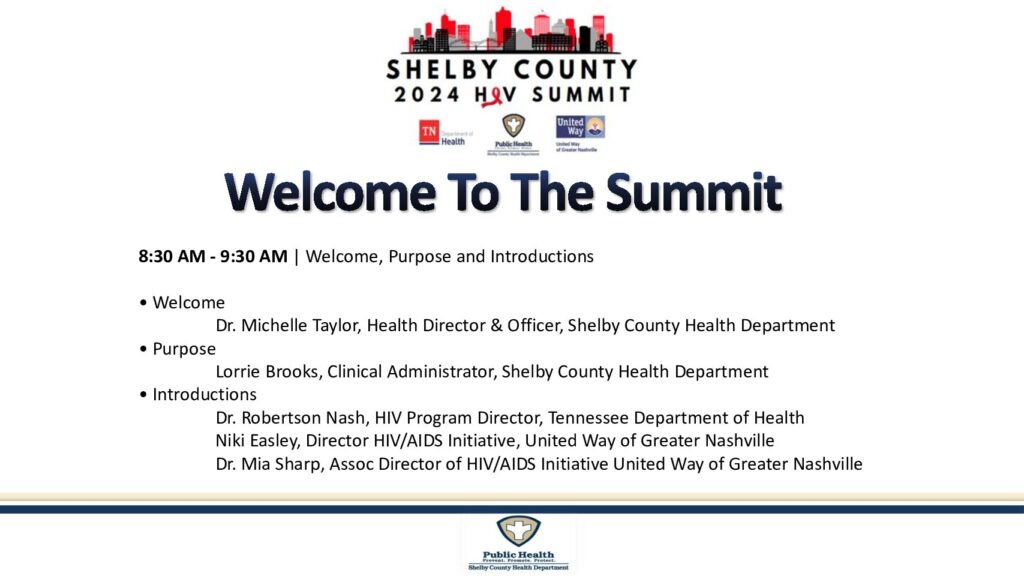On Wednesday, October 16, 2024, community leaders, healthcare providers, and government officials gathered in Memphis for the First Annual HIV Summit. The event aimed to foster collaboration and enhance the fight against HIV in the greater Memphis area. The summit’s objectives were clear: to improve client experiences and outcomes, increase understanding and engagement with Tennessee’s Ending the Syndemic Plan and the End HIV 901 Plan, and enhance coordination among various stakeholders.

A Call to Action
The summit began with a warm welcome and introductions, setting the tone for a day focused on unity and proactive engagement. Participants were asked to describe the HIV service delivery system in Shelby County in one word, a Menti activity that revealed diverse perspectives and highlighted areas for improvement.

Understanding the Epidemic
Deborah Nash presented an overview of the epidemiology of HIV in the region. The data sparked discussions about testing practices, the prevalence of neuro-syphilis, and the need for more comprehensive testing for sexually transmitted infections (STIs). One notable point was the higher HIV incidence rate, which reflects increased testing efforts but also underscores the ongoing need for prevention and education.

Engaging Youth and Faith Communities
A significant portion of the discussion centered around youth engagement. Participants emphasized the importance of educating young people and their parents about HIV prevention and healthy relationships. There was also a call to develop specific tools to engage houses of worship in conversations about HIV. The faith-based community’s receptiveness to these discussions presents a valuable opportunity to spread awareness and promote prevention.

Enhancing Coordination and Data Sharing
Dr. Nash highlighted the potential of a health information exchange to facilitate data sharing across the county. However, she acknowledged the challenges involved in cross-organizational data sharing. The Tennessee Department of Health (TDH) has a public-facing dashboard with detailed HIV-related data, which could serve as a model for improving transparency and coordination.

Addressing Language Justice and Inclusivity
Language justice was another critical topic. It’s not just about translation but ensuring that all community members, including non-English speakers, can access information and services. The summit stressed the need for culturally relevant resources and bilingual staff, particularly to support the Latino/a/x community.

Funding and Collaboration
Niki Easley from United Way of Greater Nashville (UWN) shared insights into their role as a lead agency for Ending the HIV Epidemic (EHE) initiatives. UWN’s strength lies in building relationships and engaging the community. Despite challenges such as the state’s rejection of CDC prevention funds, UWN has worked closely with TDH and Shelby County Health Department (SCHD) to support community-based organizations (CBOs) and facilitate funding.
Laurie Brooks described her role in connecting the dots, which includes initiatives like Community Cares, providing PrEP at 814 Jefferson, and community outreach. The summit highlighted the need to recruit more PrEP providers and address cost barriers. Dr. Taylor shared promising news that TennCare Medicaid is considering including PrEP, a move that could significantly improve access to this crucial prevention tool.

Collaborative Efforts
The summit concluded with a working session on how funders can collaborate and interact effectively. Participants emphasized the importance of local resources and collaboration. Eddie, a key speaker, encouraged attendees to look beyond HIV-only providers and engage with broader community resources like the AIDS Education and Training Centers (AETC) and HealthHIV.

Moving Forward
The First Annual HIV Summit was a pivotal step in the ongoing battle against HIV in Memphis. By fostering collaboration, improving data sharing, and engaging both youth and faith communities, the summit set the stage for meaningful progress. The event underscored the importance of a whole-person approach to care and the need for tailored, culturally relevant resources.
As the summit concluded, one message was clear: ending HIV in the 901 will require the collective efforts of all stakeholders, from healthcare providers and community leaders to government officials and local organizations. The commitment to this cause was evident in every discussion, and the groundwork laid at this summit promises a brighter future for HIV prevention and care in Memphis.
For more information and resources on HIV prevention and care in the Memphis area, visit End HIV 901. Together, we can make a difference and move closer to ending HIV in our community.

To check out the HIV Summit presentation deck, click this link or the thumbnail below to view



